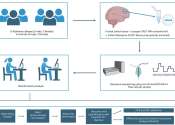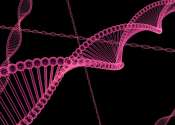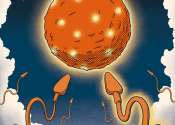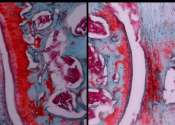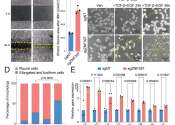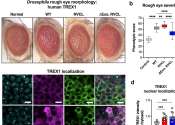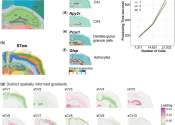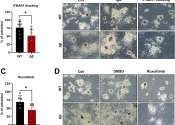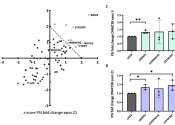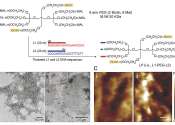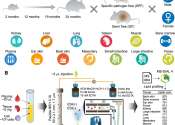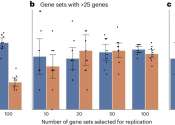Last update:
Genetics news
Genetics
Researchers discover what hinders DNA repair in patients with Huntington disease
Researchers with McMaster University have discovered that the protein mutated in patients with Huntington disease doesn't repair DNA as intended, impacting the ability of brain cells to heal themselves.
1 hour ago
0
3
Genetics
Two proteins involved in centrosome function linked to congenital developmental disorders
Centrosomes are small structures in cells with many essential functions, including roles in cell signaling and in organizing a cell's cytoskeleton. Centrosome dysfunction contributes to diseases like cancer and congenital ...
2 hours ago
0
4
Study reveals critical role of tRNA modifying enzyme in brain function
A study conducted by a research team from Kumamoto University has shed light on the critical role of a tRNA methylation enzyme, TRMT10A, in supporting brain function. The findings reveal how the absence of TRMT10A leads to ...
1 hour ago
0
0

Genetic mutations in HRAS, KRAS genes linked to childhood cancers
Hereditary changes in genes are often the cause of rare diseases. For example, disease-causing gene variants (PVs) in the HRAS gene cause Costello syndrome and PVs in the KRAS gene cause Noonan syndrome and cardio-facio-cutaneous ...
22 hours ago
0
1

Polygenic score database updates increase diversity and usability of genetic data
Important new updates to the largest open database for polygenic scores, the Polygenic Score (PGS) Catalog, could help to generate more equitable disease risk predictions for a diverse range of ethnic backgrounds.
23 hours ago
0
0

Identifying sex differences in genetic vulnerability to psychotic disorders
A team of researchers from the University of Barcelona and the Centre for Biomedical Research in the Mental Health Network (CIBERSAM) has published a study that reveals significant findings in the field of genetic psychiatry ...
23 hours ago
0
0

The gut microbiome can influence hormone levels, mouse study shows
Researchers at the Francis Crick Institute have shown that the balance of bacteria in the gut can influence symptoms of hypopituitarism in mice. They also showed that aspirin was able to improve hormone deficiency symptoms ...
Sep 26, 2024
0
116

Genetic background of pregnant women can influence non-invasive prenatal test results
Non-invasive prenatal tests (NIPTs) are increasingly an integral part of screening during pregnancies across the world. Research from Amsterdam UMC shows that a pregnant woman's genetic background influences the effectiveness ...
Sep 26, 2024
0
15

Large-scale study confirms well-established cancer risk factors and identifies new ones
Researchers have examined thousands of genetically defined traits to identify possible causal relationships for eight common cancers. The team evaluated data from more than 860,000 people to uncover potential factors in causing ...
Sep 26, 2024
0
3

Scientists discover mutation linked to early-onset Parkinsonism
A team of scientists led by Prof. Patrik Verstreken (VIB-KU Leuven) has identified a new genetic mutation that may cause a form of early-onset Parkinsonism. The research has been published in Cell Reports Medicine.
Sep 26, 2024
0
1

Scientists discover gene responsible for rare, inherited eye disease
Scientists at the National Institutes of Health (NIH) and their colleagues have identified a gene responsible for some inherited retinal diseases (IRDs), which are a group of disorders that damage the eye's light-sensing ...
Sep 26, 2024
0
6

World's first individual gene mutation test for predicting risk of sudden cardiac death
Scientists at the Victor Chang Cardiac Research Institute, working with colleagues at the Vanderbilt University Medical Center, have developed a world-first, individualized risk prediction tool for people suffering from a ...
Sep 26, 2024
0
1

Researchers establish largest stem cell repository focused on centenarians
Individuals who display exceptional longevity provide evidence that humans can live longer, healthier lives. Centenarians (greater than 100 years of age) provide a unique lens through which to study longevity and healthy ...
Sep 25, 2024
0
45

Stem cells map reveals molecular choreography behind individual variation in human development
Researchers at the Johns Hopkins University School of Medicine have mapped variation in human stem cells that explains how cells of an individual may shape a unique "developmental dance" at the molecular level, thereby controlling ...
Sep 25, 2024
0
10

Study provides new insights into development of ovarian follicles and previously unknown variations
A recent study published in Nature Communications by researchers at Karolinska Institutet offers new insights into the development of ovarian follicles, which are vital for female fertility as they contain oocytes.
Sep 25, 2024
0
46

Study reveals why children with Down syndrome have higher risk of leukemia
People with Down syndrome face a higher risk of developing leukemia. Now researchers from the University of Copenhagen and Stanford University explain why, by identifying specific changes in blood cells of people with Down ...
Sep 25, 2024
0
13

How developmental signals can contribute to genomic mosaicism
Certain developmental signals shape not only the human embryo but also play a significant role in maintaining our genetic blueprints. They prevent alterations in the genome, known as mosaicism.
Sep 25, 2024
0
12

How do rare genetic variants affect health? AI provides more accurate predictions
Whether we are predisposed to particular diseases depends to a large extent on the countless variants in our genome. However, particularly in the case of genetic variants that only rarely occur in the population, the influence ...
Sep 25, 2024
1
34

Key molecular targets for wound healing identified
Novel research, presented today at the European Academy of Dermatology and Venereology (EADV) Congress 2024, has identified key molecular targets that could significantly enhance the healing of both acute and chronic wounds.
Sep 25, 2024
0
2

Research provides first evidence of mitochondrial genetics' role in Gulf War illness
A first-of-its kind study by researchers at University of California San Diego has revealed that Gulf War illness (GWI), a chronic fatigue illness affecting veterans of the 1990-1991 Gulf War, is linked to genetic variants ...
Sep 25, 2024
0
0

Is comprehensive genetic testing worth it for patients with cancer?
Comprehensive gene panel testing, one of the exciting new tools in cancer diagnostics, warrants greater scrutiny—as does a federal program aimed at speeding up the review process for proposed new medical technologies. Those ...
Sep 25, 2024
0
0

Researchers identify genetic mutations for rare disorder causing cognitive decline
A rare cause of hereditary cognitive decline known as CSF1R-Related Disorder (CSF1R-RD) gets its name from mutations in the CSF1R gene, discovered by Mayo Clinic. Memory loss occurs as the condition advances, while early ...
Sep 24, 2024
0
177

Analytical tool quantifies cancer's ability to shape-shift
A powerful new analytical tool offers a closer look at how tumor cells "shape-shift" to become more aggressive and untreatable, as shown in a study by researchers at Weill Cornell Medicine and the New York Genome Center.
Sep 24, 2024
0
50

Human and other primate hearts differ genetically, says study
A team at the Hübner and Diecke Labs at the Max Delbrück Center has shown how human and non-human primate hearts differ genetically. The study, published in Nature Cardiovascular Research, reveals evolutionary adaptations ...
Sep 24, 2024
0
38

Scientists call for human genome research reset
Scientists are calling for human genomic research to be vastly expanded and widened to include many more people so it can fully deliver on its promise of becoming a tool for improved health care for all of humanity.
Sep 24, 2024
0
2































